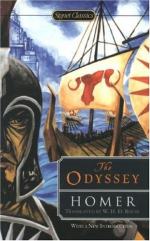{* Cf. B. xv.50}
And Menelaus of the fair hair answered him, and said: ’My friend, lo, thou hast said all that a wise man might say or do, yea, and an elder than thou;—for from such a sire too thou art sprung, wherefore thou dost even speak wisely. Right easily known is that man’s seed, for whom Cronion weaves the skein of luck at bridal and at birth: even as now hath he granted prosperity to Nestor for ever for all his days, that he himself should grow into a smooth old age in his halls, and his sons moreover should be wise and the best of spearsmen. But we will cease now the weeping which was erewhile made, and let us once more bethink us of our supper, and let them pour water over our hands. And again in the morning there will be tales for Telemachus and me to tell one to the other, even to the end.’
So spake he, and Asphalion poured water over their hands, the ready squire of renowned Menelaus. And they put forth their hands upon the good cheer spread before them.
Then Helen, daughter of Zeus, turned to new thoughts. Presently she cast a drug into the wine whereof they drank, a drug to lull all pain and anger, and bring forgetfulness of every sorrow. Whoso should drink a draught thereof, when it is mingled in the bowl, on that day he would let no tear fall down his cheeks, not though his mother and his father died, not though men slew his brother or dear son with the sword before his face, and his own eyes beheld it. Medicines of such virtue and so helpful had the daughter of Zeus, which Polydamna, the wife of Thon, had given her, a woman of Egypt, where earth the grain-giver yields herbs in greatest plenty, many that are healing in the cup, and many baneful. There each man is a leech skilled beyond all human kind; yea, for they are of the race of Paeeon. Now after she had cast in the drug and bidden pour forth of the wine, she made answer once again, and spake unto her lord:
’Son of Atreus, Menelaus, fosterling of Zeus, and lo, ye sons of noble men, forasmuch as now to one and now to another Zeus gives good and evil, for to him all things are possible,—now, verily, sit ye down and feast in the halls, and take ye joy in the telling of tales, and I will tell you one that fits the time. Now all of them I could not tell or number, so many as were the adventures of Odysseus of the hardy heart; but, ah, what a deed was this he wrought and dared in his hardiness in the land of the Trojans, where ye Achaeans suffered affliction. He subdued his body with unseemly stripes, and a sorry covering he cast about his shoulders, and in the fashion of a servant he went down into the wide-wayed city of the foemen, and he hid himself in the guise of another, a beggar, though in no wise such an one was he at the ships of the Achaeans. In this semblance he passed into the city of the Trojans, and they wist not who he was, and I alone knew him in that guise, and I kept questioning him, but in his subtlety he




